
Hulodes caranea is a species of moth of the family Erebidae first described by Pieter Cramer in 1780. It is found from India, Sri Lanka, Myanmar, Java, Hong Kong to Queensland and New Guinea, it is also found on the Marianas and Carolines.

Thyas coronata is a species of moth of the family Noctuidae first described by Johan Christian Fabricius in 1775. It is found from the Indo-Australian tropics of southern China, Taiwan, Japan, Nepal, India, Sri Lanka to Micronesia and the Society Islands.
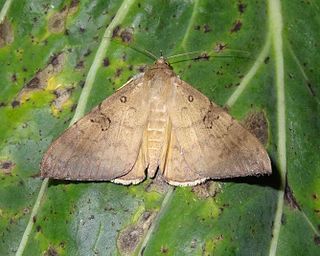
Oxyodes scrobiculata, the longan semi-looper or longan leaf-eating looper, is a moth of the family Erebidae. The common name "looper" is used despite looper moths generally being in the family Geometridae. The species was first described by Johan Christian Fabricius in 1775. It is found from the Indo-Australian tropics of India, Sri Lanka, Myanmar, China, east to Guam, Queensland, New Caledonia, Fiji, Samoa and Tonga.

Ercheia cyllaria is a species of moth of the family Erebidae first described by Pieter Cramer in 1779. It is found in the Indian subregion, Sri Lanka, Taiwan, Japan, Indochina, Thailand, Peninsular Malaysia, Sumatra, Borneo, Seram and the Kai Islands.
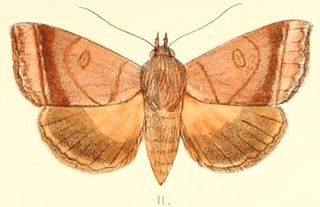
Ophiusa trapezium is a moth of the family Erebidae first described by Achille Guenée in 1852. It is found from the Indo-Australian tropics of India, Sri Lanka to Queensland, the Bismarck Islands and New Caledonia. Adults are fruit piercers.
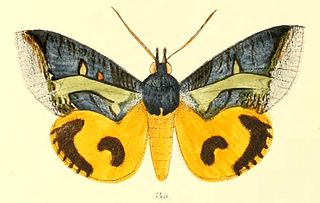
Eudocima homaena is a moth of the family Erebidae first described by Jacob Hübner in 1816. It is found in the Indian subregion, Sri Lanka, Taiwan, the Nicobars, Peninsular Malaysia, Borneo, the Philippines and on Christmas Island. It is a major pest on orange plants.

Chiasmia emersaria is a moth of the family Geometridae. The species was first described by Francis Walker in 1861. It is found in India, Nepal, northern Thailand, China, Sri Lanka, Japan and the Ryukyu Islands.
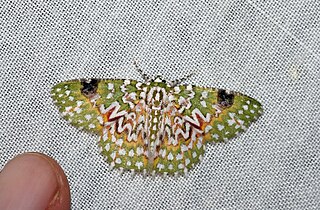
Eucyclodes gavissima, the Oriental orange banded green geometer moth, is a species of moth of the family Geometridae described by Francis Walker in 1861. It is found in the Indian subregion, Sri Lanka, Bhutan, western China, Taiwan, Sumatra and Borneo.

Mnesiloba dentifascia is a moth of the family Geometridae first described by George Hampson in 1891. It is known from the Oriental tropics.

Ischyja manlia is a species of moth of the family Noctuidae first described by Pieter Cramer in 1776. It is found in the Indian subregion, Sri Lanka, Myanmar, Thailand, China, Okinawa, Sundaland, Sulawesi, Korea, the southern Moluccas, Australia (Queensland) and Palau. Adults pierce the skin of fruit to suck the juice.
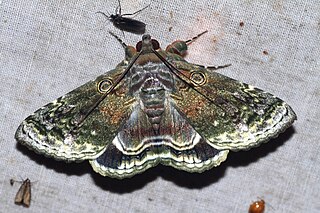
Cyclodes omma is a moth of the family Noctuidae. It is found from the Oriental tropics to the Moluccas, including India, Nepal, Vietnam, Cambodia, Myanmar, Thailand, Malaysia, Java, Bali, Sumatra, Timor, Sri Lanka, Flores, Sulawesi, the Philippines, China and Taiwan.
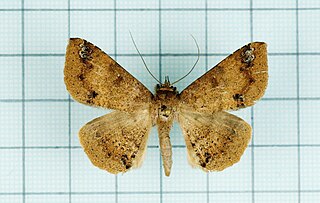
Ericeia inangulata, the sober tabby, is a moth in the family Erebidae. The species was first described by Achille Guenée in 1852. It is found in the Indo-Australian tropics of China, India, Sri Lanka, Myanmar, and the Marianas and Carolines, Fiji, Vanuatu, New Caledonia and Samoa.

Gesonia obeditalis is a species of moth of the family Noctuidae first described by Francis Walker in 1859. It is found from eastern Africa, the Seychelles, the Maldives and the Oriental tropics of India, Sri Lanka east to the Philippines, the Sula Islands and Australia. The adult moth has brown wings with a scalloped dark brown band near the margin. The hindwings are similar in pattern to the forewings but are a paler shade of brown.
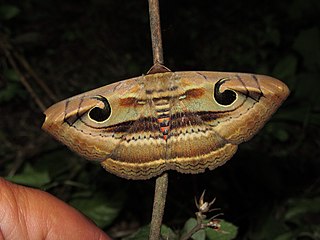
Spirama retorta, the Indian owlet-moth, is a moth of the family Erebidae. The species was first described by Carl Alexander Clerck in 1764. It is found in China, Korea, Japan (Honshu), India, Nepal, Bangladesh, Thailand, Cambodia, Myanmar, Vietnam, Taiwan, Sri Lanka, Malaysia, the Philippines (Luzon), Indonesia ,Japan.
Gymnoscelis deleta is a moth in the family Geometridae. It is found in India, Korea, Japan, Taiwan and probably in Sri Lanka according to Hampson.
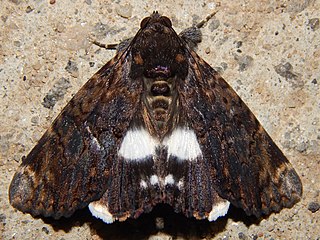
Nagia linteola is a species of moth in the family Erebidae first described by Achille Guenée in 1852. This species occurs in South Africa, the Democratic Republic of the Congo, Yemen, the Comoros, Mauritius, Madagascar, Indonesia (Borneo), India, Sri Lanka, Myanmar, Thailand and in Australia, where it has been recorded from Western Australia, the Northern Territory, Queensland and Victoria.

Isturgia catalaunaria is a moth of the family Geometridae first described by Achille Guenée in 1858.
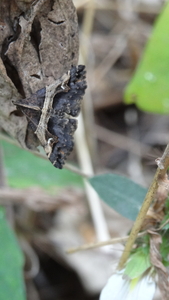
Bertula abjudicalis is a moth of the family Noctuidae first described by Francis Walker in 1859. It is found in India, Thailand, Laos, Vietnam, Taiwan and from Sri Lanka to Australia, where it has been recorded from New South Wales.
Sufetula polystrialis is a moth in the family Crambidae. It was described by George Hampson in 1912. It is found on the Louisiade Islands.
Udea ochropera is a moth in the family Crambidae. It was described by George Hampson in 1913. It is found in Colombia and Mexico.
















